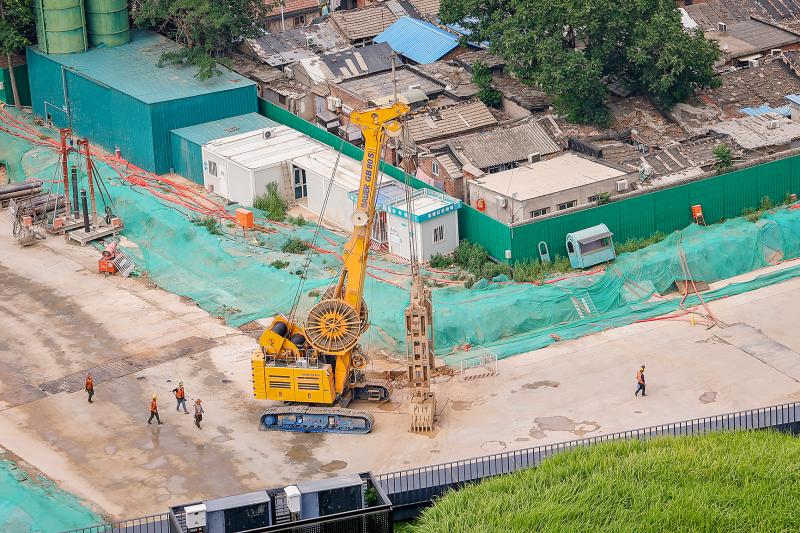The World Bank has sharply slashed its annual growth forecast for China, saying in a report yesterday that COVID-19 disruptions could further slow recovery in the world’s second-largest economy.
China is the last major economy wedded to a “zero COVID” policy, using rapid lockdowns, mass testing and strict movement restrictions to eliminate outbreaks, but it has tangled supply chains and dragged economic indicators to their lowest levels in about two years.
Growth in China is projected to slow to 4.3 percent this year, marking a steep 0.8 percentage-point drop from its forecast in December last year, the World Bank said in the report.

Photo: EPA-EFE
This “largely reflects the economic damage caused by Omicron outbreaks and the prolonged lockdowns in parts of China from March to May,” the report said, referring to the highly transmissible variant of SARS-CoV-2.
In those months, restrictions on dozens of cities including the manufacturing hubs of Shenzhen and Shanghai, as well as the breadbasket province of Jilin, battered business operations and kept consumers at home.
“In the short term, China faces the dual challenge of balancing COVID-19 mitigation with supporting economic growth,” World Bank country director for China, Mongolia and South Korea Martin Raiser said.
“The dilemma ... is how to make the policy stimulus effective, as long as mobility restrictions persist,” Raiser said.
Activity is expected to rebound in the latter half of this year, helped by fiscal stimulus and more easing of housing rules, the World Bank said.
However, domestic demand would likely recover gradually and only partly offset earlier damage related to the COVID-19 pandemic, it said.
The World Bank’s forecast adjustment came as concerns grow that China might not meet its official growth target of about 5.5 percent this year.
Chinese Premier Li Keqiang (李克強) has said that the challenges today are in some ways “greater than when the pandemic hit” in 2020, and the government has rolled out a series of measures to try and jump-start the economy.
The Chinese government has also launched a major infrastructure push this year, but the World Bank said that this was a precarious path.
“There is a danger that China remains tied to the old playbook of boosting growth through debt-financed infrastructure and real estate investment,” it said. “Such a growth model is ultimately unsustainable and the indebtedness of many corporates and local governments is already too high.”
The latest forecast also assumed that China’s “zero COVID” policy would be “maintained in the short term to avoid stressing its health care system,” meaning the possibility of recurrent disruptions.
The World Bank has also cut its global growth forecast to 2.9 percent, 1.2 percentage points below the January forecast, saying the world economy risks falling into a harmful period of 1970s-style “stagflation” in the wake of the Russian invasion of Ukraine.
“The risk from stagflation is considerable with potentially destabilizing consequences for low and middle-income economies,” World Bank president David Malpass told reporters. “For many countries recession will be hard to avoid.”
If risks to the outlook materialize, global growth could slow even more sharply — triggering a worldwide recession, Malpass said.
The report cut the US growth estimate by 1.2 points to 2.5 percent, while the eurozone forecast was cut to 2.5 percent, and Japan to 1.7 percent.
Russia’s economy is expected to contract by 11.3 percent this year.

The US government on Wednesday sanctioned more than two dozen companies in China, Turkey and the United Arab Emirates, including offshoots of a US chip firm, accusing the businesses of providing illicit support to Iran’s military or proxies. The US Department of Commerce included two subsidiaries of US-based chip distributor Arrow Electronics Inc (艾睿電子) on its so-called entity list published on the federal register for facilitating purchases by Iran’s proxies of US tech. Arrow spokesman John Hourigan said that the subsidiaries have been operating in full compliance with US export control regulations and his company is discussing with the US Bureau of

Taiwan’s foreign exchange reserves hit a record high at the end of last month, surpassing the US$600 billion mark for the first time, the central bank said yesterday. Last month, the country’s foreign exchange reserves rose US$5.51 billion from a month earlier to reach US$602.94 billion due to an increase in returns from the central bank’s portfolio management, the movement of other foreign currencies in the portfolio against the US dollar and the bank’s efforts to smooth the volatility of the New Taiwan dollar. Department of Foreign Exchange Director-General Eugene Tsai (蔡炯民)said a rate cut cycle launched by the US Federal Reserve

Businesses across the global semiconductor supply chain are bracing themselves for disruptions from an escalating trade war, after China imposed curbs on rare earth mineral exports and the US responded with additional tariffs and restrictions on software sales to the Asian nation. China’s restrictions, the most targeted move yet to limit supplies of rare earth materials, represent the first major attempt by Beijing to exercise long-arm jurisdiction over foreign companies to target the semiconductor industry, threatening to stall the chips powering the artificial intelligence (AI) boom. They prompted US President Donald Trump on Friday to announce that he would impose an additional

Taiwan’s rapidly aging population is fueling a sharp increase in homes occupied solely by elderly people, a trend that is reshaping the nation’s housing market and social fabric, real-estate brokers said yesterday. About 850,000 residences were occupied by elderly people in the first quarter, including 655,000 that housed only one resident, the Ministry of the Interior said. The figures have nearly doubled from a decade earlier, Great Home Realty Co (大家房屋) said, as people aged 65 and older now make up 20.8 percent of the population. “The so-called silver tsunami represents more than just a demographic shift — it could fundamentally redefine the